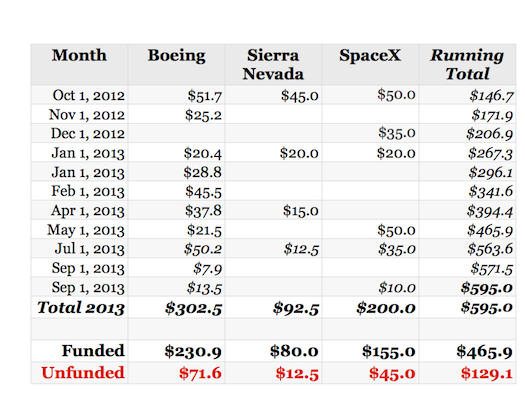Introduced by House Appropriations Chairman Hal Rogers on March 4, H.R. 933[1]: “Department of Defense, Military Construction and Veterans Affairs, and Full-Year Continuing Appropriations” was passed by the House on March 6. The goal of this appropriations bill was to fund the government, including NASA, through September of this year. For NASA, H.R. 933 represents good news and better news. For one, it offers something of a reprieve for NASA’s commercial crew program. For the Space Launch System, the bill represents a significant budget increase.
Rogers’ Senate counterpart, Barbara Mikulski, is working on a larger budget proposal that would add full-year budgets for four more Cabinet departments as well as major science and space agencies[2]. Mikulski is reportedly to file her appropriations bill Monday, March 11, with a vote by end of week. Mikulski and Rogers hope to have their bills reconciled before March 27, when the current continuing appropriations resolution, or CR, runs out, which would force the government to shutdown.
Certainly, H.R. 933 did move the House closer to the Senate when looking at funding NASA. For NASA’s budget, H.R. 933 starts with the agency’s fiscal year 2012, or FY12, budget and then makes the following changes:
| Program | FY12 Budet | H.R. 933 | Change |
|---|---|---|---|
| Exploration | $4,152.0 | $3,770.8 | $381.2 |
| Orion | $1,200.0 | $1,200.0 | $0.0 |
| SLS | $1,860.0 | $2,119.0 | $259.0 |
| SLS Ground Systems | $316.5 | $454.0 | $137.5 |
| Orion/SLS Facilities | $58.0 | $265.0 | $207 |
| Commercial Space Flight | $406.0 | $525.0 | $119.0 |
| Exploration R&D | $304.8 | $308.0 | $3.2 |
| Space Operations | $4,233.6 | $4,000 | –$233.6 |
| Cross-Agency Support | $2,995.0 | $2,847.0 | –$147.6 |
For the Space Launch System, the increase in vehicle, ground systems, and facilities funding means that the question of continued Congressional support of the SLS program is a non-starter. This is the only program to receive such large budget increases.
While the Orion program did not see a jump in its funding from FY12 levels, the House vote did increase its budget of $175.1 million from previous House FY13 levels.
Commercial Crew’s budget, specifically its CCiCap program, after the effects of sequestration, will be $499 million. While not the $830 million originally proposed by the White House for FY13, this is a $111 million bump from the $388 million (some put that figure even lower) that the program had been facing. Even with $499 million, there will be a $96 million short-fall that will result in CCiCap milestone payments ending before September 1.
Since the FY14 budget is unlikely to result in a windfall for CCiCap, NASA is facing some very difficult choices of whether to try to continue to fund three CCiCap participants or to winnow the number down to 1 or 1 1/2. If the space agency doesn’t reduce the number of CCiCap participants, then commercial crew will see the first flight of NASA astronauts delayed from 2017 to 2018. Given that support among the international partners for continuing ISS beyond 2020 is negative at best, this leaves little choice for NASA but to downselect the number of CCiCap participants sooner rather than later. Because CCiCap is funded through a Space Act agreement, NASA certainly has the needed flexibility to change the number of participants at will. Last week, NASA CFO Beth Robinson sent a note to the CCiCap participants that a change in CCiCap was possible.
- The full text of H.R. 933 can be downloaded as a PDF. ↩
- See Politico’s David Rogers’ Barbara Mikulski, Hal Rogers Play Beat The Clock ↩





Is there any consensus on which of the three CCiCap participants would be the first to be cut?
Hey Brian,
It depends upon who you ask.
I think there is a lot of excitement about what Sierra Nevada is doing with Dream Chaser. If nothing else, it keeps us in the lifting-body game. And that company is the “Little Guy” compared to Boeing and SpaceX. If anyone needs the governmwnt’s help to get into orbit, its Sierra Nevada more than SpaceX or Boeing.
Obviously, NASA’s leadership and the White House still swoons for SpaceX. But with around $1.5B in total government assistance, some say it has gotten enough to be able to start operating with a bit less government money.
Boeing has a great spacecraft. Boeing is rich compared to either Sierra Nevada or SpaceX. I think everyone recognizes that if there were a real business case for commercial space, Boeing could, and would, finish CST-100 on its own. Rumors abound that Boeing has warned NASA that it doesn’t see a business case for commercial space and may not seek to be involved in CCP beyond CCiCap. Count on Boeing being out, in my opinion.
The downs select is going to be tough. Up to now, by spreading the money to many, NASA hasn’t made enemies of the bigger New Space companies. That will change with the down-select.
Personally, I’m rooting for Dream Chaser. Maybe NASA will give Sierra Nevada 100% of its CCiCap funding and SpaceX half. But the smart money is probably on SpaceX since it’s the New Space favorite.
My dad used to work for Boeing and it has been a great company, but sometimes their attitude stinks. I think it’s more than rumors. I don’t fault them for wanting to be profitable, but they’ve fallen into a bad pattern because of government money. It could happen to anybody.
It’s taken eleven years, but SpaceX is starting to earn some respect.
I do like that a lifting body is in the competition and do believe it’s the little guys that need help. The big guys can take care of themselves.
But unless the need is dire, I do not believe the government should be handing out money (they shouldn’t be taking it in the first place.)
The winners should be those that believe in what their doing and make the better choices.
Too bad we don’t know who the winners would be before giving out money. I’m sure I’d get mine if that were the case. 😉
Ken,
Couple points.
Given the current economic uncertainty, we’re forced to be a tad more careful & so, while agree we should “help the little guy” some – I think we should be cautious when we do it. If all the public sees is failed effort after failed effort – it will only further impede what we’re trying to accomplish.
The government taking in money comment suggests you’re a libertarian. I hope I’m not taking you out of context, but I don’t mind the government taking in money so long as it is used for roads, schools, defense, etc.
Ken, everyone “believes in what they’re doing” – the winners should be those that actually do what they say they’re going to do or have at least demonstrated they have the capacity to do it. While we can’t always predict who will win – we can review their company’s accomplishments or lack there of as a guide.
Sincerely, Jason